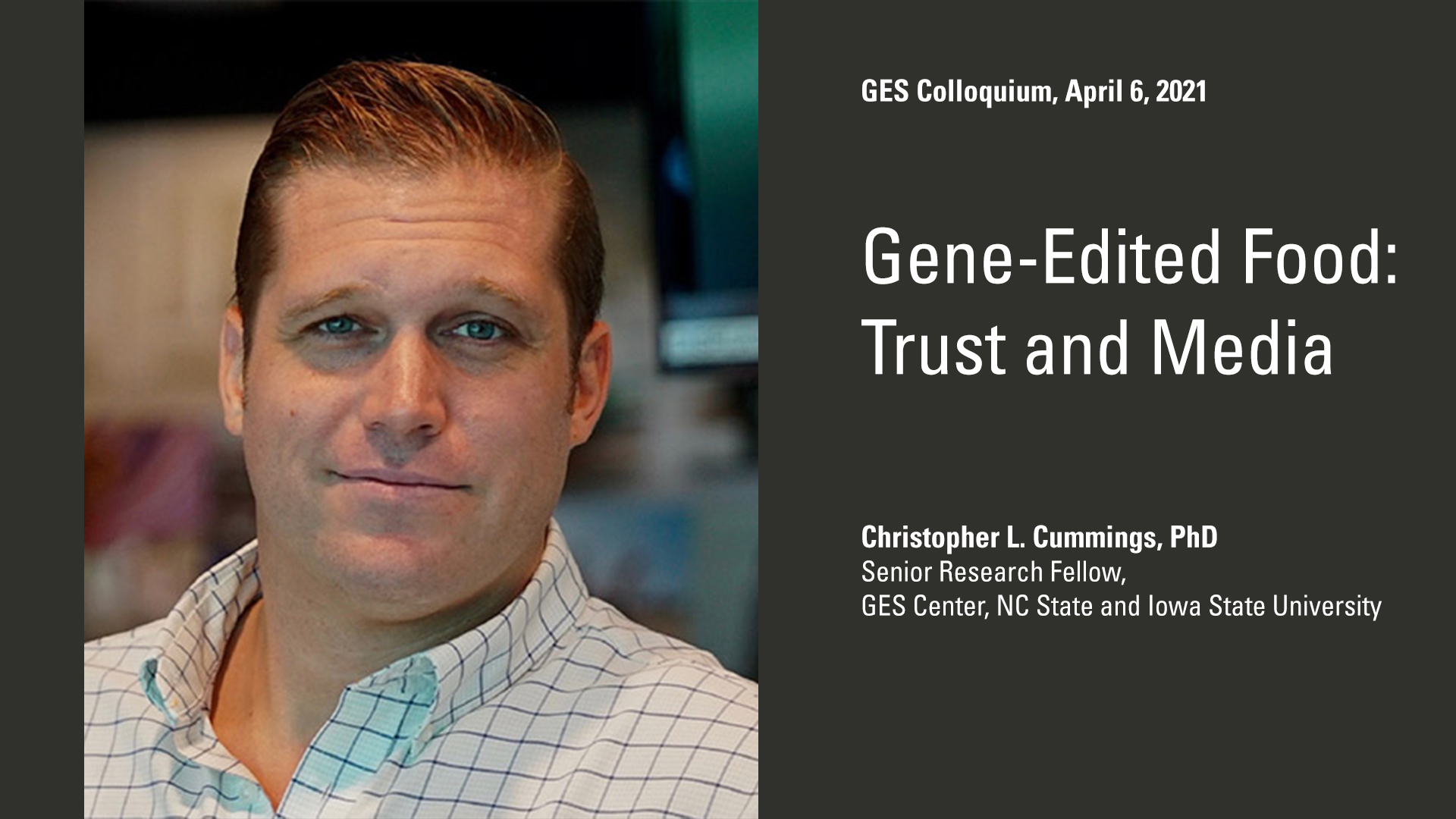
- This event has passed.
Christopher Cummings – Gene-Edited Food: Trust and Media | GES Colloquium (Zoom)
April 6, 2021 @ 12:00 pm - 1:00 pm

GES Colloquium Home | Zoom Registration | GES MediaSite | Video Archives | Podcast | @GESCenterNCSU | Newsletter
Gene-edited Food: Trust and Media
Speaker: Christopher L. Cummings, PhD, Senior Research Fellow at GES Center, NC State and Iowa State University
How we communicate about gene edited food influences trust, acceptance, and regulation.
Abstract
Recent gene-editing technologies are heralded by proponents as a revolution for developing gene-edited foods (GEFs) while critics demand increased governance and scrutiny of potential societal impacts. Like other food and agriculture technologies, realizing GEF’s potential will depend on whether the public accepts it. Proponents want to ensure that GEF avoid the intense public controversy that GMOs faced, which they argue resulted in ‘burdensome’ regulations, trade restrictions, limited international production and trade of GMOs, and diminished opportunity to realize the benefits of GMOs. This history also uncovered that efforts aimed at educating the public about the science of food technologies does not necessarily diminish skepticism or mistrust.
Instead, trust in GEF will be informed by factors that extend beyond technical risks and benefits where many proponents now acknowledge the importance of trust and the limitations of the information deficit model. Thus, proponents see an opportunity to shift priorities away from the obstinate risk and safety debates of the GMO era, and instead focus efforts to garner social license through alternative means to establish public trust and acceptance. However, consumer and environmental advocacy groups argue that GEF poses significant public acceptance challenges due to its association with GMOs, scientific complexity, and social, environmental, and ethical concerns. US government agencies including the USDA, FDA, and others are also reviewing and revising policy relevant to safety and labeling of GEF products. As this area continues to grow in attention, and more products arrive to market, proponents and critics will contend with one another to shape the future of the technology. Thus, early messaging about GEF represents a transformative symbolic and politicized locus where message attributes serve ideological mechanisms created by stakeholders in competition. The prioritized communication from proponents and critics may well be the mechanism that drives how GEF will come to be understood by the larger citizenry and will influence how it will be evaluated and governed.
This presentation reviews recent data across two studies (still in review) in this domain. The first study reports findings from qualitative interviews and provides a typology of discordant priorities from proponents and critics related to trust and acceptance of GEFs. The second study is a content analysis that identifies and compares how media messages portray potential risks and benefits and regulation of GEFs across the US and EU. Together, these studies highlight contemporary shifts in proponent approaches to cultivating public trust, and acceptance of products in the commercial marketplace.
Speaker Bio
Dr. Christopher Cummings’ work focuses on advancing public engagement with science, developing risk communication theory, and improving public health decision making across the life span. An experienced social scientist and communication campaign scholar, Dr. Cummings uses a variety of quantitative, qualitative, and mixed methods, and his work has been featured in more than 40 applied science and health venues, including the Journal of Risk Research; Regulation and Governance; Nanotoxicology; PLOS One; Science, Technology, & Human Values; and Climate Research, among others. Outside of academia, Dr. Cummings also consults with multiple government agencies across the Asia-Pacific on health risk communication issues, including dengue fever surveillance and response (Sri Lanka and Singapore), obesity and nutrition access (New Zealand), vaccine communication (Singapore, Australia, and United States), and public engagement with nanotechnology, synthetic biology, and geoengineering (Australia, United States, and Singapore). He also consults privately with various Fortune 500 companies on leadership training, strategic planning, and risk communication initiatives.